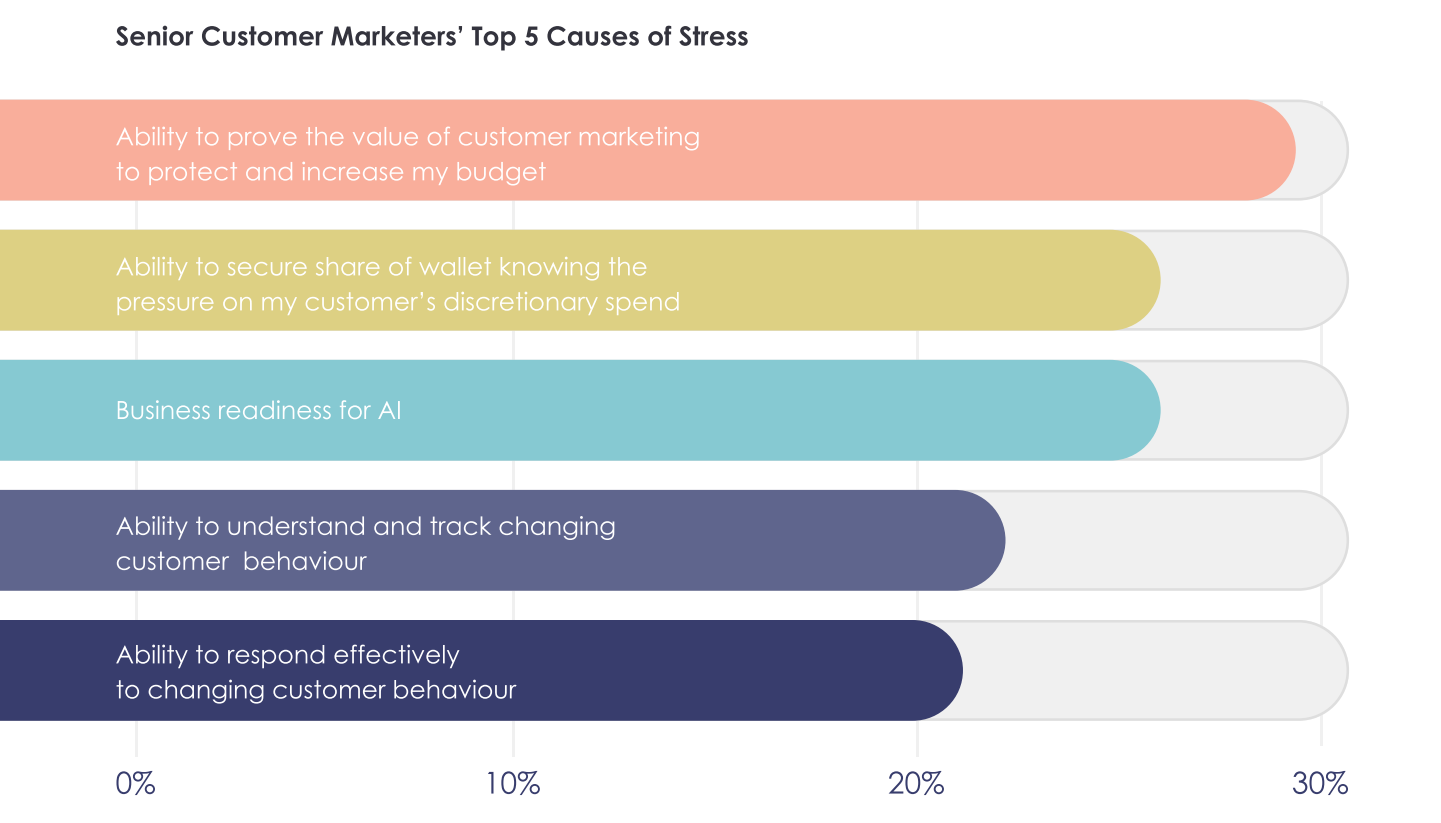Artificial intelligence (AI) has long been a hot topic in customer marketing, but recent advancements in Large Language Learning Models (LLMs) have made the potential of AI more tangible than ever before. But this explosion in visibility isn’t coming without some concerns.
Why AI is Keeping Marketers Up at Night
The rise of AI in marketing boils down to two critical questions:
- How will AI impact the role of marketing?
- What do businesses need to have in place to use AI to its full potential?
We’re not here to sound alarms about AI taking over marketing jobs. Instead, we believe that, when used correctly, AI will enhance marketing and CRM teams. It will speed up the transition from insight to action and address key content challenges, transforming how businesses understand and respond to customer preferences and needs.
Interestingly, AI readiness has now surpassed traditional marketing concerns like understanding and responding to customer behaviour. This shift highlights how technological advancements can drive business objectives, and perhaps a bit of FOMO (fear of missing out) is also at play. Regardless, AI’s prominence on the marketing agenda is undeniable.

Fast-Tracking Customer-First Agendas
The adoption of AI is poised to accelerate customer-first and loyalty initiatives. By industrialising insight and content creation, AI can deliver more relevant experiences and automate the right decisions and journeys for customers. However, before this can be achieved, several fundamental concerns must be addressed.
Key Challenges in AI Adoption
- Privacy Regulations: Nearly 30% of respondents cited stress about privacy regulations as the biggest challenge in adopting AI. Additionally, 28% are concerned about brand governance when using AI. Despite AI’s potential for content automation, hyper-personalisation, and advanced targeting, marketers remain cautious about its safety for their brand.
- Data Issues: Disjointed data is a barrier for 24% of respondents, while 22% feel their data quality is too poor. Effective AI requires a wealth of centralised customer data that can be quickly identified and matched.
- Enabling Technology: Lack of enabling technology is a concern for 26% of respondents, and 22% struggle to integrate AI with legacy systems. Marketers need the right technology to implement effective AI strategies.
Conclusion
Ultimately, AI is only as effective as the data it’s trained on. Many marketers still lack the necessary data foundations to fully leverage AI’s potential, and rigid legacy systems are holding many teams back. Addressing these challenges is crucial for businesses aiming to harness the power of AI in customer marketing.
Read our free report to learn more about senior marketeers’ everyday challenges and how to overcome them to advance your marketing initiatives.
Blog posts

Lead the Brief: How CRM Becomes a Strategic Voice in Trading Decisions
CRM teams often arrive too late to shape strategy. Showing up with live insight repositions CRM as an contributor to commercial planning , not just the…

Connect the Journey: Building Real Omnichannel Intelligence
Disconnected journeys limit CRM’s impact. When CRM connects cross-channel behaviour into a clear customer view, it drives smarter personalisation,…

Be the Monday Hero: Escape the Reporting Scramble and Get Back to Strategy
Manual reporting keeps CRM teams reactive. Automating performance insight frees them to spot customer trends, guide strategy, and focus on the work that…

Fix the Loyalty Leak: Why Smarter CRM Reduces Margin Loss
Discounts may drive short-term sales, but smarter CRM targets loyalty behaviours that protect margin and build long-term value. Strategic incentives change…

See Beneath the Surface: Turning Segmentation into Strategic Intelligence
Segmentation isn’t just for targeting. When used to surface behavioural insight, it reveals where value is created, what predicts loyalty, and how CRM can…

Become a Customer Economist: Why CRM Should Speak in Value, Not Volume
CRM is often rich in insight but fails to speak the business’s language. Reframing performance in terms of customer value is key to influencing strategy…

